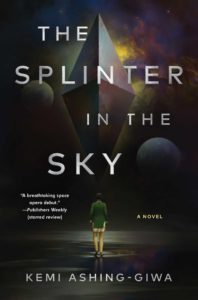
This review is based on an eARC (Advance Reading Copy) provided by the publisher via NetGalley in exchange for an honest review. The Splinter in the Sky will be released on July 11, 2023.
Sky Week at Tar Vol On marches on with The Splinter in the Sky by Kemi Ashing-Giwa. Ashing-Giwa came onto my radar a little over a year ago with the outstanding short story “Paper Suns.” After that, I was bound to be intrigued by her debut novel, and it didn’t take much for The Splinter in the Sky to catch my eye.
The Splinter in the Sky stars Enitan, a scribe and tea aficionado from a small outpost recently conquered by the Holy Vaalbaran Empire. But when her sibling disappears and her conquerors seek a political hostage, she sees the opportunity to travel to the heart of the Empire and find the answers that may save her sibling. But what she finds is even more complicated, with a rival power distrustful of an uneasy peace and complicated machinations within the Empire making it hard to tell who is really pulling the strings.
It’s not an entirely unfamiliar setup, but a likable main character and immediate personal stakes make it easy to invest in the story, and a fluid writing style makes it a quick and easy read. But The Splinter in the Sky is clearly not satisfied being merely an easy-to-read political thriller about a likable main character; from the very beginning, it sets out the task of interrogating empire, and it refuses to overlook participation in war and conquest, even if the participant is friendly and expresses private misgivings about the affair.
But it’s a short novel, and it’s difficult to develop an espionage thriller and interrogate the inner workings of empire without running up the page count, leaving a lot to the reader’s interpretation, or taking a lot of narrative shortcuts. The Splinter in the Sky chose the third option. It’s not that the shortcuts felt especially shoddy; on the contrary, they often felt like classic genre tropes. It’s just that they pushed the reading experience toward “enjoy it, but don’t think too hard about it,” which undercut the thoughtful thematic exploration.
The setup is built on a few “right place, right time” (or perhaps “wrong place, wrong time”) moments, which are easy enough to overlook. Yes, they’re unlikely, but unlikely things happen all the time, and the unlikely things are what made the heroine the heroine, as opposed to a bystander in someone else’s story. It’s genre-standard, and it’s fine. But as the novel progresses and the convenient moments keep piling up, they become harder and harder to ignore. The lead develops an intimate relationship with a staggeringly powerful figure at lightning speed, just because the person was lonely and found the candor of an outsider refreshing. And, despite no training in either diplomacy or espionage, she easily navigates an unfamiliar political landscape and discovers hidden plots by overhearing drunken complaints at a party. Her movement is restricted when the narrative is trying to establish that she’s truly a hostage (despite being officially a guest), and yet whenever she needs to explore an unfamiliar area, the barriers disappear as though they’d never existed.
All of that is common in genre stories that touch on royalty and espionage—after all, it’s important to keep the story moving, and they are reasonably plausible ways to advance the plot—so it’s hard to list out the shortcuts and call them flaws. But if they’re not flaws, they’re at least missed opportunities. Time and time again, the book has the chance to establish real narrative weight, and time and time again, it chooses the light, easy option. And so the relationship with an imperial aristocrat doesn’t convey the deep tension of the colonized trying to balance her feelings between a friend’s personality and that friend’s actions, because the relationship arose nearly instantaneously and didn’t spend adequate time grappling with those difficulties. The revelation of the shadowy figures trying to exert their power in government had no weight behind it, because there was relatively little exposition building up the investigation and the key players involved. Neither were particularly bad subplots, it’s just that they belonged in breezy popcorn thrillers—they weren’t built up to have the kind of power necessary to support a more substantive story.
As a thriller, The Splinter in the Sky is reasonably entertaining. The twists may not be shocking, but it’s an easy read with likable characters. And while the thematic work may not have the emotional weight to make it a truly powerful piece, it doesn’t let people off the hook for being likable, and the lead seeing her culture turned into entertainment for the powerful lands with some force. Overall, it’s a solid read. But unlike the story that introduced me to Ashing-Giwa’s work in the first place, it’s not a great one.
Recommended if you like: fast-paced, anti-imperial sci-fi espionage.
Can I use it for Bingo? It’s hard mode for POC Author and Published in 2023. The lead also has a Mundane Job.
Overall rating: 12 of Tar Vol’s 20. Three stars on Goodreads.
